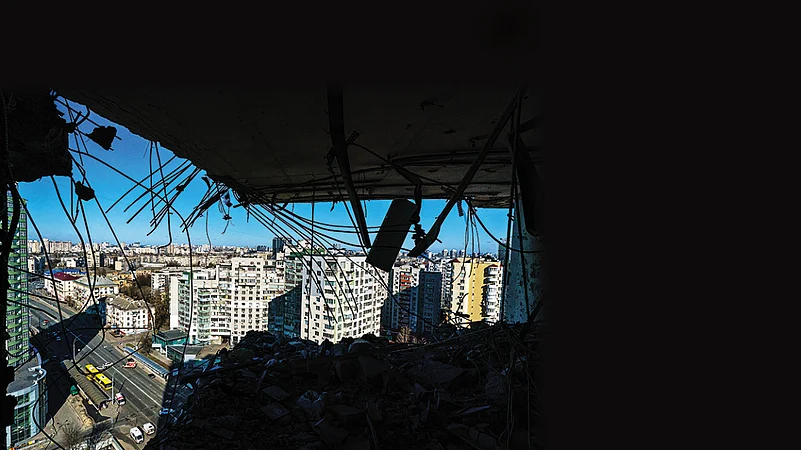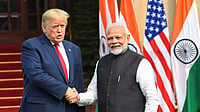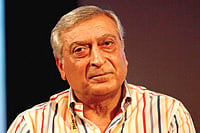At a simplistic level, Russia can be criticised for militarily intervening in Ukraine and violating its sovereignty and territorial integrity. But this does not take into account the train of events that led to this crisis. A broader perspective will enable a more objective view. The Ukraine issue has been simmering since the dissolution of the Soviet Union. President Putin is right when he characterised it as the biggest geopolitical disaster of the 20th century. A superpower armed with a formidable nuclear capability collapsed from within. The separation of Ukraine—the historical core of the Slavic Russian state and its Orthodox character—has been traumatic for Russia.
Tensions between Russia and Ukraine have been a reality over internal political conflicts within Ukraine, Russian oil supplies and pricing, ethnic, linguistic and religious differences between the western and eastern parts of the country, extremist right-wing Russia-hating nationalist elements in western Ukraine incorporated into the Soviet Union by Stalin, treatment of Russian-speaking ethnic minorities in eastern Ukraine, the push inside Ukraine to join the European Union and NATO, and so on. These came to a head in 2014 when street protests supported by the US in particular, as part of its agenda to promote colour revolutions, overthrew the legitimately-elected government of President Yanukovych over the issue of Ukraine accepting the EU offer of an Association Agreement (favoured by the protestors) and Russia’s counter-offer of joining the Eurasian Economic Union instead (favoured by the President).
Meanwhile, over the head of strong Russian protests, Ukraine (and Georgia as well) were offered NATO membership by the West in 2008. This has proved a ticking time-bomb and is the backdrop of subsequent developments. In 2014, Russia annexed Crimea—which was transferred to Ukraine in 1954 by Khrushchev, himself a Ukrainian, as part of an internal re-arrangement. Again in 2014, Donetsk and Luhansk in the Donbass region of eastern Ukraine also declared independence, leading to armed clashes between Russian-speaking militias backed by Moscow and the Ukrainian military, with destruction of infrastructure and heavy loss of civilian lives.
It is important to keep in mind that NATO has expanded four times since the demise of the Soviet Union, drawing relentlessly closer to the Russian borders. While Russia has tolerated the NATO membership of Baltic states and the erstwhile Warsaw Pact countries, it has vigorously opposed NATO membership of any of the former constituents of the Soviet Union. This Russian redline was tested by Georgia when in 2008, encouraged by US lobbies, the then President Saakashvili, sought to exert control over the separatist Republics of South Ossetia and Abkhazia, which triggered a Russian military intervention and the eventual recognition of their independence by Russia. Interestingly, Saakashvili, a Georgian, was appointed governor of Odessa by the Ukrainian government, which indicates the foreign influences at work in Ukraine.
Today, the same scenario has been repeated in Ukraine, with Russian military intervention and recognition of the independence of the Luhansk and Donetsk People’s Republics. The Minsk agreements brokered by France and Germany in 2014/15 under the Normandy format to allow constitutionally protected autonomy to these regions, with a clause that Ukraine’s NATO membership will require their consent too, have remained unimplemented despite considerable efforts. Failing this, after seven years, Russia emphatically demanded a written, legally-binding agreement with the US barring Ukraine’s NATO membership, removal of NATO troops and strike weapons from areas close to the Russian border etc. While the US showed readiness to discuss issues of strategic stability in Europe, it has rejected, and NATO as well, the demand to bar Ukraine from becoming a member of the US-led security bloc, insisting that NATO’s open-door policy for membership will continue. With US-NATO-UK arming Ukraine, sending in military trainers, challenging Russia in the Black Sea, positioning NATO troops in Estonia, Poland and Romania, the stage was set inexorably for Russian military intervention. Behind this broad picture, of course, lie differences between contending parties on facts, history, interpretations of agreements and responsibility for the course of recent events.
The failure of the West to establish a coherent security architecture in Europe after the dissolution of the Soviet Union, the complete internal disarray in Russia with the looting of its state assets by newly-minted oligarchs, even Russian efforts to be included in NATO to change its very nature, is responsible for what is currently happening. The West chose to take full advantage of Russia’s weakness to revitalise and steadily expand NATO eastwards despite the promise not to extend it beyond East Germany after German reunification, isolate Russia from Europe in tandem with the eastwards expansion of EU too, with Ukraine’s entry into NATO and EU as the coup de grâce against Russian security.

The argument that all sovereign countries should have the choice to enter into alliances as they will is not an honest one. It is couched in principle but behind its lies predatory geopolitics. The West is well aware of Russia’s concerns and knows the potential dangers of keeping the doors open to Ukraine’s membership, but it has gambled on the Russian sense of its weakness. The other argument that Ukraine’s NATO membership is not on the agenda for now is precisely the one that Putin rejects and wants a formal legal agreement so that the membership does not come to pass in unforeseen circumstances in the future. The third argument that Russia seeks to create spheres of influence is absurd, when the extension of NATO and EU does that precisely in Europe.
Russia is concerned that even without NATO membership, US-NATO can entrench themselves on the ground by arming Ukraine, giving it threatening capabilities and establishing permanent military outposts and missions, which would make a military intervention by Russia even more difficult in the future, if needed. Russia is right in claiming that with the West in Ukraine it will become defenceless. The parallel Putin makes with Russian missiles placed in Mexico or Canada being totally unacceptable to the US is valid. He has underlined that it is not Russia that is moving its forces to the borders of the US, it is the US that is doing so.
Russia’s invasion of Ukraine has invited draconian sanctions, as threatened publicly by President Biden, in which Europe has joined. President Putin himself as well as Foreign Minister Lavrov have been personally sanctioned, as have all the members of Russia’s National Security Council. Top Russian businessmen and major financial institutions, even the Central Bank, have been subjected to financial or travel sanctions, with major Russian banks excluded from the global Swift banking system. Russian TV channel RT and media agency Sputnik News have been banned by the EU, which has also sanctioned 351 Russian MPs who voted in favour of the military intervention in Ukraine. This shows that possessing formidable nuclear power provides no protection if the West bands together against a country. Russia is treated as if it is a nuclear-aspirant Iran. Sanctioning the head of state of a permanent member of the UN Security Council shows how this instrument is being wielded with impunity by the West. It is not clear how this conforms with any definition of international norms, the rule of law or a rules-based order that the West constantly underlines.

The banning of RT and Sputnik News exposes the hypocrisy of the West on the issue of press freedom and freedom of expression. To claim these two Russian media outlets are purveying state propaganda or fake news will be judged as absurd by those who watch RT, which is a serious channel. The reality is that the West is determined to control the narrative on issues of interest to them and not allow an alternative narrative to take hold. Shielding their own public from being influenced by RT shows a sense of insecurity. How state-controlled information is worse than the free press in the West, which spews venom against Putin and Russia and conditions public thinking about them, is debatable. The propaganda against India by the New York Times, the Washington Post, the Economist and so on shows that a free press is no guarantee of objective information. The way India is rapped by the West for temporary restrictions on Internet access to avoid violence or control terrorism contrasts with EU’s ban on Russian media. The Ukrainian crisis has also exposed how our own press is incapable of reporting responsibly on international affairs. It is treating the Russian assault on Ukraine as a quasi-assault on India, with an outpouring of emotional sympathy for Ukraine and castigation of Russia as the aggressor, ignoring the complex causes of the conflict and the need for mature, balanced and factual reporting, with due consideration of not being entirely out of line with the country’s foreign policy interests in search of TRPs.
India has rightly abstained in the UNSC and in the UNGA on the West-sponsored resolutions. While it is a fact that Ukraine’s sovereignty and territorial integrity have been violated, the issue is more complex. The US and Europe have themselves done this in Europe itself by dismembering Yugoslavia and regime changes in West Asia. The effort should be to contain the conflict, secure a ceasefire and push for negotiations. The Ukraine issue will figure several times in the UNSC as the confrontation between Russia and the West will be prolonged. How many times will India vote against Russia, as the West wants, without destroying our ties with Russia? Tomorrow, the West can let India down if it suits its interests. Our ties with the US are very important but if they hinge on the position we take on Ukraine based on our legitimate national interest, they will remain fragile. A veritable strategic partnership should be based on respecting the legitimate interests of each side and give room for differences where core interests are not in conflict. Our abstentions do not harm the US. Besides, the US and the West do not take sides on our territorial issues involving China and Pakistan and continue to “sit on the fence” even today.
(This appeared in the print edition as "Putin’s War: To Be or NATO Be?")
(Views expressed are personal)
Kanwal Sibal is a former Indian foreign secretary

























